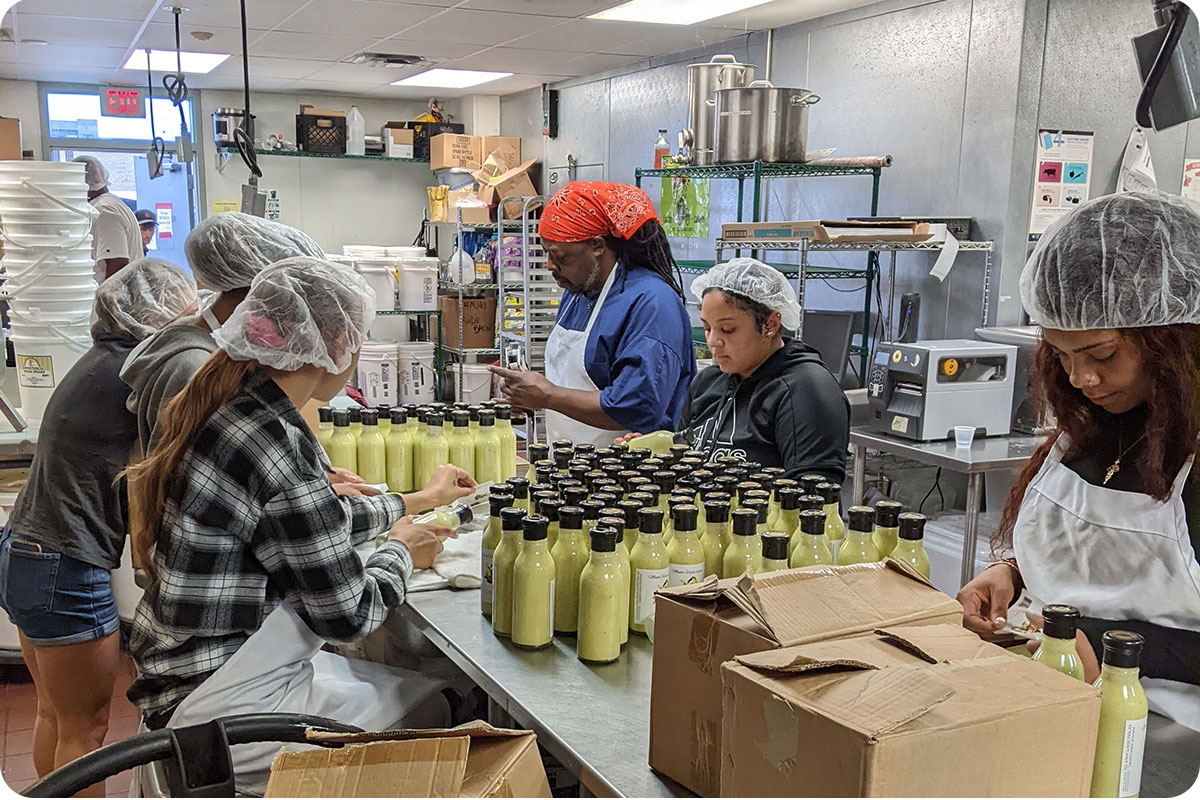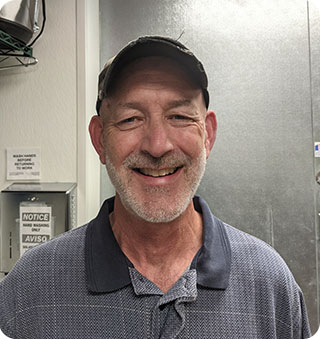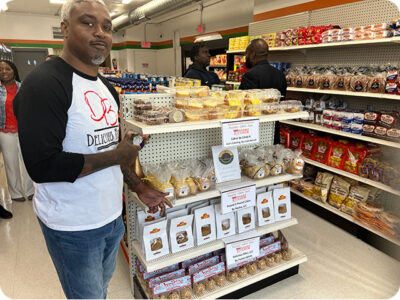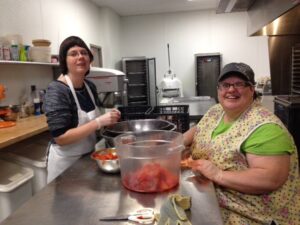
Community kitchens like FEED Kitchens in Madison provide food entrepreneurs with room to grow while also chipping away at food insecurity.
The pandemic shook up many industries, but its effects on food—both retail and restaurants—were unique and pronounced. Panic buying and manufacturing shutdowns exposed supply chain vulnerabilities—but the rapid development of take-out and home delivery options ultimately served up a benefit of convenience for consumers while helping restaurants make up for lost business. Meanwhile, people stuck at home rediscovered the comfort in a shared meal and the pleasure of getting creative in the kitchen.
The pandemic upended one particular sector—community commercial kitchens—interrupting the momentum of a movement that had just been starting to pick up steam. In 2019, more than 600 shared use kitchen facilities were operating in 48 states, and half of them were less than five years old, according to a nationwide survey conducted by Econsult Solutions Inc., Urbane Development, the Food Corridor, and Catharine Street Consulting.
These shared kitchens help bridge a gap for people seeking to start a business selling food, making smaller ventures possible without the expense of investing in a commercial kitchen solely dedicated to one business. In addition, many of these kitchens host innovative offerings that help to address food insecurity in their communities. Food security is essential to creating an Economy for All, and WEDC’s support for community commercial kitchens serves this goal while simultaneously supporting entrepreneurship.
COVID-19 chaos

Chris Brockel, Director of Food Systems, FEED Kitchens
Upstart Kitchen was scheduled to open in Milwaukee in late March 2020—but that didn’t happen. With non-essential businesses ordered to close, the new kitchen couldn’t get city inspectors to visit the site to assess readiness to open. Instead, PRISM Economic Development Corp., which runs the kitchen operations, started a free community meal program to keep its members busy, feed schoolchildren, teach entrepreneurs how to use kitchen equipment, and help the community.
At the same time in Madison, FEED Kitchens had just recorded the highest revenue in its six years of operation. But with the lockdown, the food carts and caterers that made up the bulk of FEED’s income shut down. FEED pivoted and started a new program, FEED to Go, with five chefs preparing 600 meals a day and delivering them to neighborhoods with lower-income residents. “The pandemic was a seminal moment,” says Chris Brockel, director of food systems.
After a year or two of caution, though, things turned around for some commercial shared kitchens.
FEED Kitchens saw a big influx. “The number of food cart vendors and bakers grew tremendously,” Brockel says. First, bakers flocked in, moving from home kitchens to commercial kitchens. Later, food cart vendors returned “as folks decided to take control of their own lives and work situations.”
Chef Pam’s Kitchen, in Waukesha, had been open for one year when the pandemic hit. So many people sought out its cooking classes and rental shared kitchen during the difficult time that the business moved into a larger space, just down the block. “We were bursting at the seams,” says owner Pam Dennis.
In rural areas, though, shared kitchens have struggled, and some have closed.
Growing trend
Shared commercial kitchens are a significant trend around the country, according to a government report. A 2021 report by the U.S. Department of Agriculture called shared commercial kitchens “an innovative and newly emerging sector in the food supply chain … They provide a valuable resource to communities who seek to address potential barriers to business development, including access to facilities and capital.”
In the 2019 survey, more than 80% of the kitchen operators said nurturing successful food entrepreneurs is their main mission while 30% cited business incubation as their primary function.
The commercial kitchens also provide an important sense of community, that survey noted: “Shared kitchens act as economic clusters where food entrepreneurs can benefit from co-location and cooperation. Clusters bolster startup success and survival by growing the pool of specialized resources, improving access to suppliers and cooperative purchasing, knowledge sharing, and accelerating paths to market.”
The survey found that 54% of kitchen incubators are in an urban area, 25% in suburbs, and 21% in rural regions. What follows is a look at some of the commercial kitchen operations around Wisconsin.
FEED Kitchens
FEED Kitchens in Madison is believed to be the oldest and largest commercial shared kitchen enterprise in Wisconsin. Owned and operated by Madison’s North Side Planning Council, FEED Kitchens opened in late 2013. It houses five food production areas, with $500,000 worth of specialized equipment that members can reserve, and has 16 employees.
As of spring 2024, FEED has 93 members, including more than 20 food trucks and about a dozen caterers. Of its membership, 70% are people of color and 50% are women-owned businesses. “That’s our goal. We serve people who traditionally don’t have access. We supply space that is affordable,” says Brockel.

FEED Kitchens partners with the local community to host the Black Restaurant Jamboree.
FEED goes well beyond providing kitchen equipment. Its bakery training program, aimed at teaching skills to unemployed and underemployed residents, now pays participants for their work. FEED cookies are a popular bakery product sold in several grocery stores and the Willy Street Co-op. “The pandemic pushed the bakery from breaking even to making a nice profit,” says Brockel.
Food entrepreneurs who join FEED get assistance with paperwork, such as licensing, vending permits, and safe food handling certification, as well as advice on goal-setting, ingredient sourcing, packaging, and marketing. As ways to showcase some of its member chefs, FEED holds a holiday bazaar and partners with the Madison Black Chamber of Commerce to host the Black Restaurant Jamboree in August.
FEED Kitchens is also the base of operations for Healthy Food for All, a food recovery program that Brockel co-launched before he joined FEED. It collects excess food from local farms, large catered events, and stores and transports the bounty to local meal sites and food pantries.
Brockel is proud of FEED Kitchens’ 30 or more graduates, including Beef Butter BBQ restaurant, Madison Chocolate Co., 100 Mile Sauce Co. condiments and Bloody Mary mix, and Fifth Scoop vegan and gluten-free ice cream. He said FEED’s members reported a combined $2.5 million in revenue in 2023.
But perhaps most importantly, he is happy to help food entrepreneurs make connections: “Anyone can do business here, no matter the skill level or where they live. People talk and share—they are very supportive of each other.”
Upstart Kitchen

Bishop Walter Harvey, Upstart Kitchen
Upstart Kitchen got its start as a way to help a Milwaukee neighborhood heal after the 2016 fatal police shooting of Sylville Smith. Protesters smashed windows and threw rocks at police. “Our neighborhood was under siege,” says Bishop Walter Harvey, executive director of PRISM EDC, who was senior pastor of the Parklawn Assembly of God church at the time. “Our church began to listen and learn so we could lead. One of the things we heard was the need for economic growth.”
Harvey’s idea was to buy buildings near the church and turn them into facilities that could create job opportunities. The church formed PRISM EDC, a nonprofit, as a way to “eliminate poverty and create generational wealth” in the Sherman Park neighborhood, says Harvey.
Partnering with a Parklawn Assembly of God church member who purchased a former barber shop, PRISM turned it into the space for Upstart Kitchen. It includes a 2,200-square-foot licensed commercial kitchen, comparable to the church’s own commercial kitchen, which Upstart also uses. Together, they offer five work spaces.
“We didn’t realize initially that the number of people who are cooking in their home kitchens is astronomical. They do this as a side hustle. But the state, city, and county have regulations about food businesses. This is an opportunity for us to help take the dreamer to the next level,” says Harvey.
Upstart has stainless steel equipment, a walk-in freezer and cooler, and “convection ovens that can make 900 cookies in 15 minutes,” he says. “They can turn a person’s business around overnight.”
More than two dozen food entrepreneurs have used Upstart Kitchen to scale their businesses, including Baked Dream Creations bakery and Style Pop Café, a coffee brewer. Upstart Kitchen has benefited from a $50,000 Capacity Building Grant from WEDC.

Bakers who use Upstart Kitchen are able to sell their products at local grocery stores.
Chef Pam’s Kitchen
Pam Dennis, a retired Navy nurse, and her husband, Brian Dennis, who had a retail background, had no idea how much their food business would mushroom when they started Chef Pam’s Kitchen in 2019. Influenced by her mother’s excellent cooking and the Italian dishes she loved during the two years she was stationed in Naples, Italy, Pam had gone back to school with help from the GI bill and earned an associate degree in culinary management from Waukesha County Technical College.
When Chef Pam’s opened, Dennis did it all—prepped food, taught classes, and swept the floor. Today, more than 30 food artisans rent the kitchen space, which offers four production kitchens. Their products include hot sauce, keto-friendly soups and biscuits, vegan cookies, take-and-bake lasagna, and gourmet delivered meals.
Chef Pam’s also has a retail market that sells the products made in its kitchens, including pizza kits featuring Pam’s homemade sauce. The $10,000 first-place prize that Chef Pam’s won in WEDC’s Downtown Pitch Contest in 2021 helped purchase the equipment needed to set up the marketplace.
Chef Pam’s now has 25 employees and offers a wide range of classes, from pierogies to macarons, from Jamaican dishes to Portuguese favorites. The business hosts special events and holds a winter farmers market to draw people downtown when the popular Waukesha summer farmers market ends. “Customers who come to our market explore the downtown businesses, even in winter,” says Dennis, who has set her sights on franchising as a next step for the business.
Rural kitchens
Maintaining a shared commercial kitchen in smaller, rural areas is more of a challenge. Several that had been operating in places such as Algoma, Green Lake, Mineral Point, and Green County have closed.

Sharing Spaces Kitchen, in Prairie du Chien, opened in 2011 with a dual mission of becoming a shared use kitchen and incubator for food entrepreneurs, as well as a place to employ people with disabilities.
Sharing Spaces Kitchen, in Prairie du Chien, is one of the survivors. But it hasn’t been easy.
Sharing Spaces opened in 2011 with the dual mission of becoming a shared use kitchen and incubator for food entrepreneurs, as well as a place to employ people with disabilities and teach them food preparation and service skills, says Pam Ritchie, CEO of the Opportunity Center, the nonprofit that runs the program.
“What we learned is that most of the food entrepreneurs were not quite market-ready. A lot of business development would be needed,” Ritchie says. So, Sharing Spaces changed its business model to co-packing, or manufacturing food products for artisans. But the cost of the service was higher than artisans wanted to pay.
The construction of Sharing Spaces Kitchen was funded with a $300,000 Community Development Block Grant from Crawford County; a $33,750 Community Development Investment Grant from WEDC helped renovate a building for an adult day center and Café Hope (an extension of Sharing Spaces Kitchen). More recently, the program found a new partner, the Crawford County Aging and Disability Resource Center, which uses Sharing Spaces to make healthy meals for a senior meals program. An area business also uses the kitchen to make a variety of food products.
Operating a shared kitchen in a small community is very difficult, Ritchie says, especially the logistics of getting employees there and sending shipments out: “Transportation costs are astronomical. And we don’t even have an interstate here.”
Kickapoo Culinary Kitchen, in Gays Mills, runs a small shared kitchen within its community building, which also houses village offices, the library, and police department. Catering businesses and local bread and pie bakers rent the kitchen space, and it is used to host family events, says Village President Harry Heisz.
In Viroqua, the massive Food Enterprise Center is a 100,000-square-foot industrial building that had housed a National Cash Register printing plant for 40 years. After the plant closed in 2009, eliminating 81 jobs, the private, nonprofit Vernon Economic Development Association (VEDA) bought the building and redeveloped it into a multi-tenant facility to help businesses grow.
The Food Enterprise Center includes two commercial kitchens, each about 3,000 square feet, with nine steady tenants. When a food business gets traction, it can use the manufacturing and packaging portion of the center. Currently, 24 food and wellness businesses are in production there. Wonderstate Coffee, Fizzeology, and Driftless Provisions are among the tenants; Wisco Pop is one of the graduates. In 2023, the center’s businesses reported total gross sales of $145.4 million and 358 jobs, with 110 of the jobs on site.
“We are really proud of the community of entrepreneurs that we’ve built. They help each other, share advice, and mentor each other,” says VEDA Executive Director Susan Noble. “Our tenants are all local; we’re supporting our own local entrepreneurs. This is really community development.”
